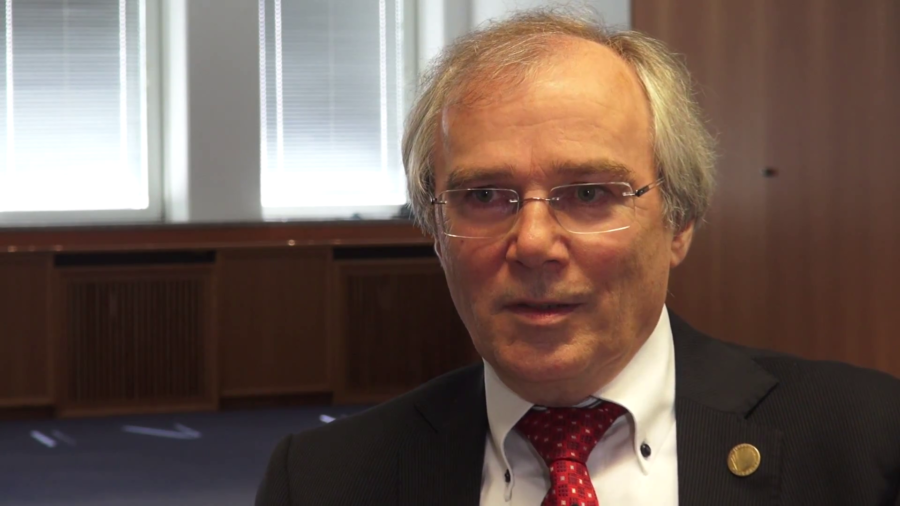Kees Neggers: My role in Internet development, I’ve been involved in the setting up of the national research network in the Netherlands and have been the managing director of SURFnet from the start in ’88 until my retirement last year. And the task of SURFnet was to provide an advanced research network for the research and higher education community in the Netherlands. And as such we had to push the envelope all the time. So in the 80s, networking was sketchy. There were all kinds of private networks and there was this major OSI development that would solve all the future networking problems but didn’t deliver yet. And then the Internet came around and that was the only way really to bring advanced services to the research community at that time. So we got involved in that, automatically. And of course, being responsible for pushing the envelope, I got involved in pushing the Internet envelope as well.
Intertitle: Describe one of the breakthrough moments or movements of the Internet in which you have been a key participant.
Neggers: There were some of course moments that were…you could call disruptive. That mentality changed and then things were…moving forwards. In the beginning, in Europe we had PTT monopolies and we had to use their services—no other way. In the Netherlands we were lucky that the PTT and the government allowed us to move ahead of that. And the PTT provided us with bandwidth that we were allowed to use for our networks and we were no longer forced to use their networks. In their view, that of course would only be temporary, and after they would have implemented that for everybody and we would come back and use their services.
Of course in the end it turned out that the PTT services in Europe were not able to serve the research community, and the Internet came around and even today the PTTs serve Internet services to everybody, of course. So we made the whole circle.
And in that timeframe, we had to pass many hurdles. And the first one was of course getting bandwidth, which we were lucky in the Netherlands. And the second one was getting bandwidth that scaled, because the needs of these users grow exponentially. They were… Researchers could always use whatever was available. And we are looking again in the Netherlands that we were allowed to provide these Internet services in parallel to our future developments. And so the users didn’t have to wait until the final network was there. And of course in the end the final network never came around and the Internet continued.
Intertitle: Describe the state of the Internet today with a weather analogy and explain why.
Neggers: Well I think the Internet is pretty cloudy today. I don’t say that it is more than partly cloudy. And you risk storms. And we better be prepared for that. It’s obvious that the Internet is a tremendous success, and the world is not prepared to live without it anymore. At the same time, it has never been designed to provide the services it is assumed to do today. So it’s a lot of difficulties. And we have to move ahead of that. So in my view we really need a clean slate to solve these problems. Continuing to patch the Internet is no longer working. We have really really reached the end of that. It’s amazing how that patchwork has survived so long and how many more things have been possible than had ever been thought when it was designed. But we have now reached the end, in my view, and a clean slate is needed. And that means more research is needed. Of course there’s the additional handicap that it has to be compatible with what we have because no one wants to get out of this anymore. They have seen the benefits and we have to continue with that.
Intertitle: What are your greatest hopes and fears for the future of the Internet?
Neggers: Well my fear is that people will continue to try to patch the existing Internet. And my hope is that people will really have the courage to start with a new, well-designed Internet, based on what we now know about what the real needs are, what the Internet needs to serve, and then implement that.
Interviewer: What does a well-designed Internet look like?
Neggers: Well, the current Internet has some fundamental design flaws. It has never been designed to deal mobility, with multihoming. Security. These are essential elements of a future-proof network. The current Internet doesn’t scale to serve the whole world. It doesn’t scale— We found some patches to do voice over the Internet, but now we have to do video over the Internet. You’re making video now. You need another Internet. And then you walk around with your mobile phone. You want another Internet to be served by that phone, much better than you are today.
Intertitle: Is there action that should be taken to ensure the best possible future?
Neggers: Again, governments have to step in and fund appropriate researchers to design this new network. And of course take the risk that a number of vested interests will oppose it, but nevertheless support building something new that serves the users in the end.
Further Reference
Kees Neggers profile, Internet Hall of Fame 2013
